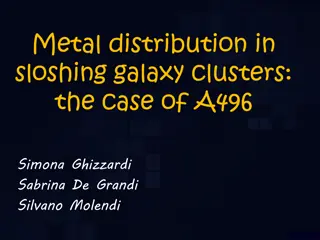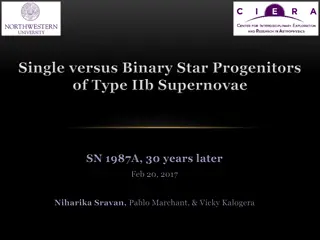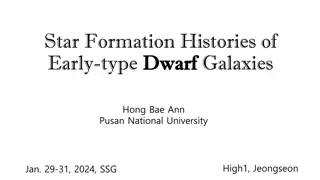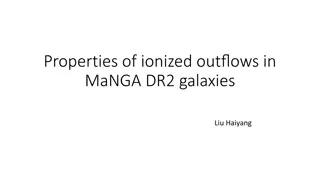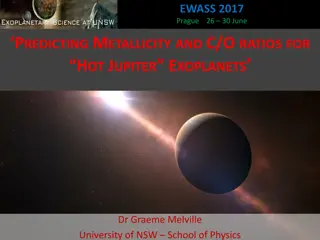Metal Distribution in Sloshing Galaxy Clusters: A Case Study of A496
Metal distribution in sloshing galaxy clusters, focusing on A496 cluster's XMM observations, cold fronts, spiral patterns, and Fe abundance across NNW cold fronts. Sloshing mechanisms in cool core clusters and the role of sloshing in redistributing metals are explored through analysis of metallicity
0 views • 17 slides
Unveiling the Progenitors of Stripped Envelope Supernovae (SNe)
The mechanism behind the stripping of stripped-envelope SNe remains a key question linked to their progenitors. Various mechanisms such as Single Star Progenitors, Binary Star Progenitors, Stellar Winds, and Close Binary Interactions are thought to dominate the stripping process. Observations of Typ
0 views • 12 slides
Investigating Star Formation Histories of Early-Type Dwarf Galaxies
Delve into the star formation histories of early-type dwarf galaxies, exploring their significance as local objects and prime targets for near-field cosmology. Understand the complexities of re-ionization, age, metallicity, and morphology in the context of galaxy evolution. Uncover the relationships
0 views • 30 slides
Properties of Ionized Outflows in MaNGA DR2 Galaxies
The evolutionary path of galaxies is marked by gas reservoirs that fuel star formation and feed supermassive black holes, influenced by feedback processes such as galactic outflows. This study analyzes ionized outflows in MaNGA DR2 galaxies, focusing on data samples, spectral fitting, and sample sel
0 views • 15 slides
Prediction of Metallicity and C/O Ratios for Hot Jupiter Exoplanets
Dr. Graeme Melville from the University of NSW explores the modeling of atmospheres for hot Jupiter exoplanets, emphasizing the importance of temperature, PT profiles, metallicity, and the C/O ratio. Utilizing the Versatile Software for Transfer of Atmospheric Radiation (VSTAR), the research aims to
0 views • 27 slides
